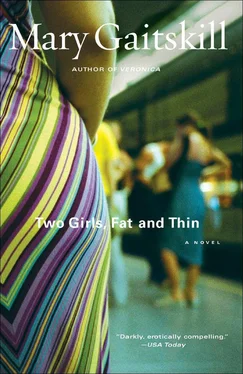Mary Gaitskill - Two Girls, Fat and Thin
Здесь есть возможность читать онлайн «Mary Gaitskill - Two Girls, Fat and Thin» весь текст электронной книги совершенно бесплатно (целиком полную версию без сокращений). В некоторых случаях можно слушать аудио, скачать через торрент в формате fb2 и присутствует краткое содержание. Год выпуска: 2012, Издательство: Simon & Schuster, Жанр: Современная проза, на английском языке. Описание произведения, (предисловие) а так же отзывы посетителей доступны на портале библиотеки ЛибКат.
- Название:Two Girls, Fat and Thin
- Автор:
- Издательство:Simon & Schuster
- Жанр:
- Год:2012
- ISBN:нет данных
- Рейтинг книги:5 / 5. Голосов: 1
-
Избранное:Добавить в избранное
- Отзывы:
-
Ваша оценка:
- 100
- 1
- 2
- 3
- 4
- 5
Two Girls, Fat and Thin: краткое содержание, описание и аннотация
Предлагаем к чтению аннотацию, описание, краткое содержание или предисловие (зависит от того, что написал сам автор книги «Two Girls, Fat and Thin»). Если вы не нашли необходимую информацию о книге — напишите в комментариях, мы постараемся отыскать её.
Review) create a haunting and unforgettable journey into the dark side of contemporary life and the deepest recesses of the soul.
Two Girls, Fat and Thin — читать онлайн бесплатно полную книгу (весь текст) целиком
Ниже представлен текст книги, разбитый по страницам. Система сохранения места последней прочитанной страницы, позволяет с удобством читать онлайн бесплатно книгу «Two Girls, Fat and Thin», без необходимости каждый раз заново искать на чём Вы остановились. Поставьте закладку, и сможете в любой момент перейти на страницу, на которой закончили чтение.
Интервал:
Закладка:
When I woke late in the afternoon, I called “writer” again. Again, no response. Instead of relief, I felt irritation. Why had this person put his/her number on a bulletin board if he/she didn’t have a machine to take calls? I called twice in the following three days and was rewarded only with ringing. My irritation increased; still I was grateful to the nincompoop who didn’t answer the phone. My life, divided into habitual motions of eating, reading, shopping, carrying loads of laundry back and forth on the same street, taking cabs to work, clutching my bags of snacks, had become laconic and disconnected; my strongest feeling in this scheme of things was the settled sense in my stomach when I sat before my desk at work. “Writer” had sent a current quivering through my quotidian existence, and now everything was significant. As I rode to work at night, I saw New York from Granite’s perspective for the first time in eight years. The buildings of Wall Street became symbols of conquest, power, and money, the luscious fruit of life lived in the solid truth. The men who drove cabs and manned the rickety wooden candy/newspaper stalls were soldiers in the battle to uphold these standards. Mary, the white-haired word processor who works with me, was transformed from a cranky old woman into a fighter for the cause of concrete ideals; she was an excellent and compulsive worker who skipped lunch breaks, eating instead from a green box of Mystic Mint cookies in her drawer. Opposite her was the enemy, Joan, the complaining young woman who let her stomach hang out, who wrote articles on leftist painters who “challenge even our most basic assumptions about what is moral,” and who would sneak away from her machine whenever she could to call her boyfriend and yell at him.
My almost daily calls to “writer” took on the ritual quality of my calls to Dial-A-Horoscope. It was a useless gesture and I knew it, yet somehow it was satisfying, a duty performed, a pretension of contact. I was taken off guard when she finally answered.
“Hello?” Her voice was flat, nearly metallic, except for the high pitch that made it the voice of a prematurely serious child. She said she was a free-lance journalist and that she wanted to write an article on Granite’s philosophy, Definitism.
“I’ve just recently realized what an impact it has had on this country’s psychology,” she said solemnly. “It’s quite remarkable. I don’t think any other novelist has done anything comparable.”
We talked enough for me to feel reassured that she wasn’t one of Granite’s enemies. I was lulled by the expressionless, melancholy quality of her voice.
“There’s one thing I’d like to know,” I said. I paused. “Let me preface this. During the beginning stages of the movement, there were a lot of people attracted to it who were a bit crazy. They would come to the meetings and say things about banding together and going off to an island to build a Definitist society — crazy. Granite was very kind to them of course, but she wasn’t interested in those people. And I don’t think their nutty ideas were any reflection of Definitism. I just think that any major movement will attract its share of fanatics.”
“Oh, I agree.”
“And I wondered if those were the kind of people you’ve been seeing, so far.”
The voice retained its flat thoughtfulness. “Well, I haven’t done an interview yet. On the phone a few have sounded a little unhinged, but most of them seemed pretty ordinary, as far as I could tell. But I’m the last person to make judgments of other people’s sanity.”
“Yes, there is always that,” I agreed. “There have been times, in the past, when I was a little bit. crazy myself. But those days are over. In any case, it wasn’t the craziness in me that was responding to Anna Granite. It was the sanity.”
“Well, seriously, I expect most Definitists to be quite sane,” she said.
I was pleased after we hung up, and ready to start the project of the interview. I wrote “Justine Shade—10:00 A.M. — interview” inside one of the red-numbered squares on my calendar.
That was how it began, although to an objective party, it might look as though I were the strange world into which Justine unwittingly pitched herself. In any case, her effect on my mind and heart was immediate: the sad, voluptuous memories of Anna Granite would become, in the three or four days that would pass before the interview, memories of my childhood, as well as other things I don’t like to think about. I spent hours before my legal documents, in my bed, and in the dream state of my cab rides, speculating on what kind of person Ms. Shade might be. I hadn’t had a conversation about Anna Granite in at least eight years; in fact I couldn’t remember the last time I’d had a genuine conversation at all. I invented possible scenarios daily, growing more and more excited by the impending intellectual adventure.
My wildest invention, however, didn’t prepare me for what actually happened, which was mind-boggling even in the context of my circuitous and exhausting life. I had thought of Anna Granite as the summit of my life, the definitive, devastating climax — and yet perhaps she had only been the foreshadowing catalyst for the connection that occurred between me and Justine, the bridge without which our lives would have continued to run their spiritually parallel courses. But that is probably just the way it looks now.
Chapter Two
Justine Shade was a neurotic , antisocial twenty-eight-year-old. She had few friends, and as she saw them infrequently, her main source of entertainment was an erratic series of boyfriends who wandered through her small apartment, often making snide comments about her decor. She was serious about her career as a journalist, but she sold very few articles. This was because she got ideas at the rate of about one a year, and once she had one, she went through a lengthy process of mentally sniffing, poking, and pinching it before she decided what to do with it.
To support herself, she worked part time as an assistant secretary for a doctor of internal medicine. The job was lulling and comfortingly dull. Dr. Winkgard was an energetic, square, bad-tempered, good-hearted man, and his wife Glenda was a beautiful forty-year-old whose bright, erotic spirit, in combination with the stubborn way she held her mouth, made Justine think of a pungent, freshly cut lemon. The living room-like office was furnished with proud armchairs, a fiercely thin-cushioned sofa, a drawing of a geometric cat, and a radio that perpetually leaked a thin stream of classical music. The black-and-white striped walls and the purple carpet haughtily complemented each other. This office was the last place Justine would have expected to get an idea. But the fateful article on Anna Granite, which would, in an entirely unforeseen fashion, alter the course of her life, was born as she sat behind her desk, peacefully sorting papers.
Читать дальшеИнтервал:
Закладка:
Похожие книги на «Two Girls, Fat and Thin»
Представляем Вашему вниманию похожие книги на «Two Girls, Fat and Thin» списком для выбора. Мы отобрали схожую по названию и смыслу литературу в надежде предоставить читателям больше вариантов отыскать новые, интересные, ещё непрочитанные произведения.
Обсуждение, отзывы о книге «Two Girls, Fat and Thin» и просто собственные мнения читателей. Оставьте ваши комментарии, напишите, что Вы думаете о произведении, его смысле или главных героях. Укажите что конкретно понравилось, а что нет, и почему Вы так считаете.












